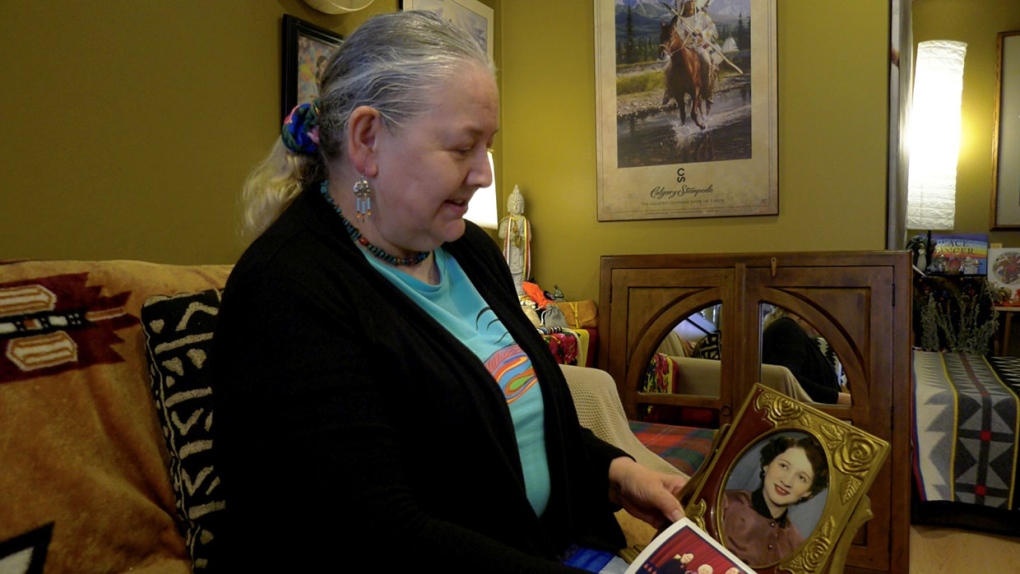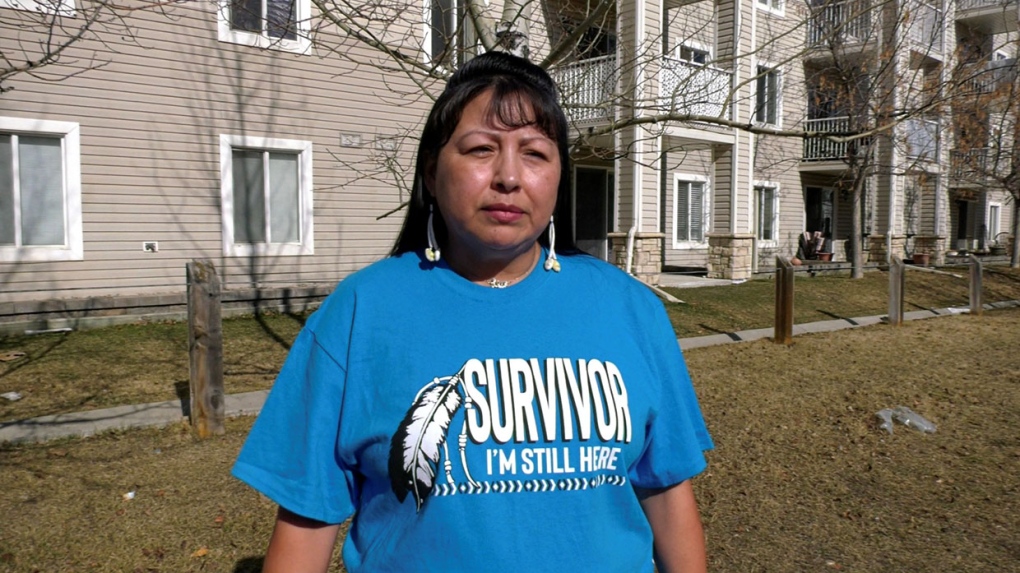Alberta residential school victims respond to Pope's apology amid further calls for justice
An apology from Pope Francis for the Catholic Church’s role in the Canadian residential school system is deemed by many victims as long overdue as calls for justice grow louder amongst those still suffering inter-generational traumas.
Jackie Bromley, who attended St. Mary’s Residential School on Alberta’s Blood Reserve as a child says the apology is a good start towards creating a stronger relationship between Canada and Indigenous peoples.
“We have endured years of inequality and injustices which continue today, we have been sharing our traumas for years and no one listened. Finally, the Catholic Church stood up,” she said.
“This is what residential school survivors like myself wants to hear because Canada and the churches need to acknowledge and take responsibility. Sorry will never change the past but now Canada and Indigenous people can truly reconcile because without an apology, no one can truly move forward.”
SETS THE FOUNDATION
Adam North Peigan, who currently sits as the national president of the Legacy Foundation in Ottawa agrees that an apology sets the foundation for reconciliation, but the 60s Scoop survivor wants more action.
“That apology actually needs to come home to Canada so that the Indigenous people across Canada can gather to bear witness and correct historic wrongs that happened,” he said.
“So, we’re very hopeful and optimistic that's going to happen because it really needs to be heard in person you know, from the pope himself on Canadian soil, on indigenous land.”
This day however was one that many residential school survivors thought they would never be alive for, including 91-year-old Eve Caroline Shaw who attended St. Michael’s school in Saskatchewan as a child.
Her daughter, Cheryle Chagnon-Greyeyes spoke to CTV News Friday after the announcement and says her mother was overjoyed.
“I walk this red road of Indigenous spirituality and I know that it's a bridge really between the non-Indigenous and Indigenous people, and that's why today's apology to me was important,” she said.
“It wasn't enough, but it was a first step in the right direction. I honestly never thought it would happen, at least not in my lifetime, or my mother's. So to see it happen as a gift to her in her 91st year, I'm thrilled for her, she's very happy.”
 This day however was one that many residential school survivors thought they would never be alive for, including 91-year-old Eve Caroline Shaw who attended St. Michael’s school in Saskatchewan as a child. Her daughter, Cheryle Chagnon-Greyeyes spoke to CTV News Friday after the announcement and says her mother was overjoyed. “I walk this red road of Indigenous spirituality and I know that it's a bridge really between the non-Indigenous and Indigenous people, and that's why today's apology to me was important,” she said.
This day however was one that many residential school survivors thought they would never be alive for, including 91-year-old Eve Caroline Shaw who attended St. Michael’s school in Saskatchewan as a child. Her daughter, Cheryle Chagnon-Greyeyes spoke to CTV News Friday after the announcement and says her mother was overjoyed. “I walk this red road of Indigenous spirituality and I know that it's a bridge really between the non-Indigenous and Indigenous people, and that's why today's apology to me was important,” she said.
AN ‘UNAPOLOGETIC APOLOGY’
The apology from Pope Francis is not being accepted by everyone, including Nicole Johnston who suffered traumas as a day school student at an Anglican Church in the 1970s on the Piikani Nation.
She also continues to suffer inter-generational impacts as several of her family members attended residential schools.
“In the beginning when I heard the pope stating how he would not did not want to make an apology to the Indigenous people here on Turtle Island, I knew right then that if he were to ever in the future, make an apology or decide to make, it would be an unapologetic apology,” she said.
 The apology from Pope Francis is not being accepted by everyone, including Nicole Johnston who suffered traumas as a day school student at an Anglican Church in the 1970s on the Piikani Nation.
The apology from Pope Francis is not being accepted by everyone, including Nicole Johnston who suffered traumas as a day school student at an Anglican Church in the 1970s on the Piikani Nation.
Johnston is now calling for the removal of the Doctrine of Discovery, a papal bull, or edict which was pronounced by Pope Alexander VI in 1493.
The document gave European explorers the right to claim lands not inhabited by Christians and deemed Indigenous people unworthy of legal protections.
“We want the Doctrine of Discovery scrapped because we’re not even recognized as humans and we also want all surviving priests charged with crimes against humanity,” she said.
“Then, maybe then, an apology from the Pope would be accepted.”
Other Indigenous advocates and survivors like Melanie Fiddler agree that an apology is not good enough.
She says her great grandmother was sent to jail because she didn’t want to send her children to a residential school.
“This apology was a slap in the face, what a disgrace and a disgust to me and all survivors and our ancestors,” she said.
“There are actually no words to explain in the human way what they've done to our own people."
Fiddler adds that more Indigenous representatives should have been allowed to attend the Pope’s apology at the Vatican.
"That just goes to show that historical token Indian mentality that they sold us on how many generations ago is still going and there's no inclusiveness for within,” Fiddler said.
“And yet, the B.C. Indians are not even being represented, it speaks volumes, let alone outside we didn't even get to hear the apology. As a survivor myself, trying to reclaim myself this just goes to show we had no cushion not even from our own people and our people are so entrenched in this division from that system.”
INDIGENOUS ARTIFACTS
Another issue raised by many Alberta Indigenous advocates and survivors of trauma from the residential school was the fact that many of the Indigenous artifacts at the Vatican have not been returned to Canadian soil.
Michelle Robinson, who is the niece, grand daughter, and great-granddaughter of residential school survivors is calling on the Catholic Church to also return important documents to Canada.
"Our artifacts and our things being returned. Back to us because a lot of those are sacred items. On top of just being family heirlooms like they these are things that really matter to us and they should be returned,” she said.
“A lot of those documents actually contain the names of a lot of the children so that way we can look at these records here with Indian Affairs and make sure that were naming some of those unmarked graves properly.”
CALGARY CATHOLIC DIOCESE RESPONDS TO APOLOGY
Bishop William T. McGrattan of the Roman Catholic Diocese of Calgary attended the Pope's apology for the Catholic Church’s role in the Canadian residential school system and provided the following statement to CTV News.
“The experience of being at the meetings with Pope Francis and with the delegations of the Inuit, Métis, and First Nations has been both inspiring and humbling personally and for the rest of the bishops in attendance,” the statement read.
“I will be bringing home with me profound moments of grace in witnessing firsthand the historical meeting with the Holy Father. I am grateful for having been a part of this moment of history. These memories will certainly guide us as we prepare for the pilgrimage of Pope Francis to Canada and as we continue to walk forward together.”
CTVNews.ca Top Stories

B.C. tenants evicted for landlord's use after refusing large rent increase to take over neighbouring suite
Ashley Dickey and her mother rented part of the same Coquitlam duplex in three different decades under three different landlords.
Mountain guide dies after falling into a crevasse in Banff National Park
A man who fell into a crevasse while leading a backcountry ski group deep in the Canadian Rockies has died.
Expert warns of food consumption habits amid rising prices
A new survey by Dalhousie University's Agri-Food Analytics Lab asked Canadians about their food consumption habits amid rising prices.
MPP Sarah Jama asked to leave Ontario legislature for wearing keffiyeh
MPP Sarah Jama was asked to leave the Legislative Assembly of Ontario by House Speaker Ted Arnott on Thursday for wearing a keffiyeh, a garment which has been banned at Queen’s Park.
Charlie Woods, son of Tiger, shoots 81 in U.S. Open qualifier
Charlie Woods failed to advance in a U.S. Open local qualifying event Thursday, shooting a 9-over 81 at Legacy Golf & Tennis Club.
Ex-tabloid publisher testifies he scooped up possibly damaging tales to shield his old friend Trump
As Donald Trump was running for president in 2016, his old friend at the National Enquirer was scooping up potentially damaging stories about the candidate and paying out tens of thousands of dollars to keep them from the public eye.
Here's why provinces aren't following Saskatchewan's lead on the carbon tax home heating fight
After Prime Minister Justin Trudeau said the federal government would still send Canada Carbon Rebate cheques to Saskatchewan residents, despite Saskatchewan Premier Scott Moe's decision to stop collecting the carbon tax on natural gas or home heating, questions were raised about whether other provinces would follow suit. CTV News reached out across the country and here's what we found out.
Montreal actress calls Weinstein ruling 'discouraging' but not surprising
A Montreal actress, who has previously detailed incidents she had with disgraced Hollywood producer Harvey Weinstein, says a New York Court of Appeals decision overturning his 2020 rape conviction is 'discouraging' but not surprising.
Caleb Williams, Jayden Daniels and Drake Maye make it four NFL drafts with quarterbacks going 1-3
Caleb Williams is heading to the Windy City, aiming to become the franchise quarterback Chicago has sought for decades.
































